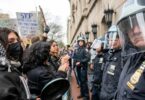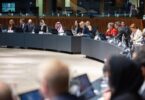Hasan Basri Yalcin
Most American foreign, national security policies are shaped by bureaucratic organizations, not the political administration.
There was a time when people questioned the Ame-rican approach to the Middle East. They asked whether then-President Barack Obama had a grand strategy or not, mainly because he was displaying some hesitant foreign policy behavior. While he was using rhetoric in support of democratization, he failed to sufficiently support any democratic process. He declared the use of chemical weapons a red line in Syrian War, but he easily ignored it when the Assad regime crossed that line. He allowed Russians to intervene in Syria although he was critical of the Russian invasion of Crimea. Similarly, in most of the international crises that broke out during his tenure, Obama did the opposite of what he preached. Because of these ambivalent attitudes, some argued that in fact Obama had no foreign policy and/or national security strategy.
Ambiguity: Management tool: After all, this has taken on greater clarity right now. His retrenchment strategy set noninvolvement into world affairs as a policy target. Accordingly, the US would not intervene directly. But this policy requires some form of uncertainty. Obama for that reason deliberately worked to increase ambiguity, which was employed as a management tool. He produced expectations that were never satisfied. But expectations were all kept alive. Leaders all around the world hoped that Obama would, one way or another, react to international aggressors, such as Vladimir Putin, or conflicts, such as Syria. However, Obama was consciously and consistently hesitant. This was part of his strategy. He attempted to cover up his strategy by making it look like a nonexistent strategy.
Now he is gone. But the hesitant attitude in American foreign policy is still present. Should it be viewed as a legacy of Obama followed by the American state even after the end of his term in office? Is the conscious ambiguity of the Obama strategy still alive?
Trump era not promising either: Trump, during his election campaign, dedicated himself to a firm opposition against any Obama policy. Therefore, he was expected to act unlike Obama. However, one year into his tenure, the American approach in the Middle East has only slightly changed. No major shift is expected in the short run. People still find it difficult to describe the American strategy in the Middle East in definitive terms.
Trump signed an extortionate arms sales agreement with Saudi Arabia. This act was interpreted as a permission and active support for the Saudi sanctions against Qatar. In fact, Trump said in one of his tweets at the time that during his visit to Saudi Arabia he was convinced that Qatar was behind most of the “terrorist groups.” However, two days later, US Secretary of State Rex Tillerson declared that the US was not directly supporting the sanctions against Qa-tar. A few days later, Qatar and the US signed another arms deal. So it became clear that the US was actually not taking sides in this crisis. A form of noninvolvement policy, with the help of ambiguity, was being employed once again.
US support for PKK offshoots: Another example of this situation is the US support for the Kurdish Democratic Union Party (PYD). Since the Obama administration, Washington has provided heavy weaponry, political legitimacy, and air support to this PKK offshoot in northern Syria. Despite Turkey’s repeated denunciations of using one terrorist group against another, the US support for the PKK/PYD has risen under the Trump administration.
However, the Americans also kept using reassuring words on Syria’s territorial integrity. It seems that the US is not feeling comfortable with the Astana peace process since it means enhanced roles for Russia, Turkey, and Iran, even though it does not openly criticize the Astana negotiations. So what they really think is never fully discovered.
US government in the grip of inertia: A more recent example of American hesitancy and ambiguity can be found in northern Iraq. When the Masoud Barzani administration announced its decision for the independence referendum, the first reaction from the US was not welcoming. Through repeated declarations, it was made clear that the US was in fact in favor of an independent Kurdish state in northern Iraq but skeptical about the timing. It seems that the current American focus is the fight against Daesh specifically in Raqqa. Any kind of activity beyond that is considered a deviation. This illegitimate referendum and its many likely consequences might easily trigger a new wave of regional instability, which in turn could trigger many unexpected crises. Iranian and Turkish intervention in northern Iraq would certainly mean another field of controversy, which would require further US involvement. Considering the inertia in the US government and its unwillingness for any such involvement, it is obvious why Washington asked for postponement of the referendum.
Yet, most observers found the American position softer than expected. If the US wants a stable and integrated Iraq and believes that it is not the right time for a referendum, then it should put some pressure on Barzani. Accord-ing to these observers, Barzani would not dare to act so boldly without, at least, tacit Am-erican approval. So it can be argued that the US is in fact tacitly supporting Barzani.
Such an explanation has some merits. Of course, Barzani cares about American approval. Of course, the US could put more pressure if it really cared about stability in Iraq. Therefore, one can believe that the US has a foot in both camps. And it seems convincing.
Cacophony rules: However, this belief overlooks the current power vacuum in the US government. It assumes that the US speaks with one voice. Recent developments in the US, however, tell us otherwise. It is hard to believe that there is a cunning US plan behind all these developments. In fact, most of the steps being taken by the Trump administration are less crafty and less designed compared to those during the Obama years.
Instead, most American foreign policy and national security priorities are shaped by various bureaucratic organizations, rather than the political administration itself. There is a huge power vacuum.
Trump has so far failed to build an operational government. Because of the absence of a strong and resolute president and government, bureaucratic organizations such as the Pentagon and Centcom are developing their own approaches and trying to affect policy choices. Therefore, a cacophony is dictating the nature of the American approach. This is but a natural outcome: the absence of strong political leadership is the reason for the absence of a coherent strategy.
Conflicting US actions
The most recent example of American foreign policy in the Middle East shows that they are not designed strategies but simply stories of failure. Just two days ago the Pentagon declared its support for the Turkish military operation in Idlib and its support for the Astana talks. Today the US Embassy announced it would suspend all visa applications made from Turkey. This was certainly unexpected. Of course, there are a number of other controversial issues between Turkey and the US concerning the Fetullah Terrorist Organization (FETO) and the July 15 coup attempt. Despite repeated Turkish demands, the US has failed to take assuring steps in examining the coup attempt in Turkey. The leader of the organization resides in Pennsylvania and there is no indication that he is being subjected to a full investigation. In addition, since the coup attempt, most Turkish citizens have held the view that the US was involved in the coup attempt and even actively supported it. Instead of providing convincing arguments against all these rumors, the American mission in Turkey has kept escalating the tension in the personality of a controversial ambassador. He is about to leave right now. And unarguably his term will be remembered as one of the most problematic in the history of US-Turkish relations. But Ambassador John Bass did little to ease the problems. He personally acted as a catalyst in most of the cases with his controversial assessments.
Right now, because several officers in the US mission have been arrested in Turkey owing to their suspected ties to FETO and the coup attempt, the US Embassy is overreacting.
It is hard to believe that the US government is behind this decision. Most probably the mission in Turkey made such an irresponsible decision in order to negate its highly suspect hand in the coup attempt. But simply put, this is far too bold and far exceeds the powers of a mission. In the next few days, the political leadership will probably have to step in and change the decision. But still, this will be yet another example of the inconsistencies of US foreign policy.






